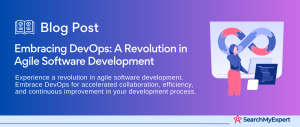DevOps Training and Certifications: Unlocking the Door to Efficiency and Collaboration
DevOps – a term that blends ‘development’ and ‘operations,’ revolutionizes how we think about IT. It’s not just a methodology; it’s a cultural shift, fostering collaboration between software developers and IT professionals while automating software delivery and infrastructure changes. This approach aims to create a more agile, efficient, and responsive IT environment.
The Power of DevOps: Benefits Unleashed
- Enhanced Collaboration:
Breaking down silos, DevOps encourages open communication and collaboration, leading to more innovative solutions. - Faster Deployment:
With continuous integration and delivery, updates are more frequent and reliable. - Increased Efficiency:
Automated processes mean less manual intervention, leading to improved
efficiency. - Better Problem Solving:
With shared responsibilities, teams address issues more effectively and proactively. - Customer Satisfaction:
Quicker deployment and high-quality products lead to happier customers.
Riding the Wave of Demand: DevOps in Today’s Job Market
DevOps skills are hot commodities in today’s tech job market. Companies are on a constant lookout for professionals who can bridge the gap between software development and IT operations. This demand has surged due to:
- The need for faster business transformations.
- The increasing complexity of IT systems.
- The drive towards digitalization in various industry sectors.
Pathways to Mastery: Types of DevOps Training and Certifications
There are several pathways for those looking to gain or improve their DevOps skills:
- Online Courses and Tutorials:
Ideal for self-learners, these offer flexibility and a wide range of topics. - Bootcamps and Workshops: Intensive, hands-on experiences that provide practical skills in a short time.
- Certification Programs: Offered by renowned institutions and tech companies, these validate your skills and knowledge.
Some popular certifications include:
- AWS Certified DevOps Engineer
- Docker Certified Associate
- Kubernetes Certification
- Puppet Professional Certification
Understanding DevOps Tools and Technologies
The DevOps Arsenal: Tools That Make a Difference
DevOps thrives on tools and technologies that automate, streamline, and enhance the software development lifecycle. Here’s a rundown of some essential tools:
Git: The Cornerstone of Version Control
- What It Does:
Git tracks and manages code changes. It’s essential for source code management and collaborative coding. - Why It’s Key: It allows multiple developers to work together without code conflicts, ensuring a smooth workflow.
Jenkins: Automation at Its Best
- What It Does:
An open-source automation server, Jenkins helps in continuous integration and delivery. - Why It’s Key:
It automates the build, test, and deployment phases, making the development process faster and more efficient.
Docker: Revolutionizing Containerization
- What It Does:
Docker packages software into containers, ensuring it works seamlessly in any environment. - Why It’s Key: It eliminates the “it works on my machine” problem, standardizing development environments.
Kubernetes: Orchestrating Containers
- What It Does:
An open-source platform for managing containerized applications, providing scalability and failover for your application. - Why It’s Key:
It simplifies the deployment and scaling of applications, managing containers efficiently.
Ansible: Automation for Everyone
- What It Does:
A simple yet powerful automation engine that automates cloud provisioning, configuration management, and application deployment. - Why It’s Key: Its simplicity and flexibility make it easy to automate complex tasks.
Terraform: Infrastructure as Code
- What It Does:
Terraform allows you to define and provision infrastructure using a high-level configuration language. - Why It’s Key:
It’s instrumental in managing multi-cloud environments and ensures consistency and reproducibility.
Tools in Action: Real-World Impact
Organizations worldwide are leveraging these tools to enhance their DevOps capabilities. Here are some examples:
- Git and Jenkins: A major financial services company uses Git for source code management and Jenkins for continuous integration, significantly reducing its time-to-market for new features.
- Docker and Kubernetes: An e-commerce giant uses Docker and Kubernetes for containerization and orchestration, ensuring their systems scale effectively during high-traffic events like Black Friday.
- Ansible and Terraform: A global telecommunications provider uses Ansible for configuration management and Terraform for infrastructure provisioning, achieving faster and more reliable service deployments.
Understanding and effectively utilizing these tools can drastically improve the efficiency and reliability of software development and operations. As the heart of DevOps, they are indispensable for any organization looking to thrive in the digital age.
Choosing the Right DevOps Training Program
Navigating the Training Terrain: Factors to Consider
Selecting the right DevOps training program is crucial. Consider these factors:
- Budget:
Your financial readiness plays a pivotal role. Training programs range from free online courses to premium boot camps. - Time Commitment: Are you looking for a quick course or an in-depth program? Assess your availability and choose accordingly.
- Learning Style: Do you prefer self-paced learning or structured classes? Choose a format that aligns with your learning habits.
- Career Goals:
Define your objectives. Are you starting, enhancing skills, or seeking a complete career shift?
The Training Titans: A Look at Popular Providers
Several platforms offer a range of DevOps courses. Here are a few notable ones:
Udemy: Versatile and Affordable
- Offers a wide range of DevOps courses for beginners to advanced learners.
- Ideal for those seeking affordable, self-paced learning.
Pluralsight: In-depth and Skill-Oriented
- Known for its comprehensive course content and skill assessments.
- Best for those seeking to deepen specific DevOps skills.
ACloudGuru: Cloud-Centric Learning
- Focuses extensively on cloud-based DevOps practices.
- Perfect for learners aiming to specialize in cloud-based DevOps environments.
Linux Academy: Hands-On and Practical
- Offers in-depth, hands-on courses with a focus on Linux and cloud technologies.
- Suitable for those who prefer practical, real-world scenarios.
Training Tailored to Your Needs
Based on individual needs and preferences, here are some recommendations:
- For Budget-Conscious Learners: Udemy’s range of DevOps courses offers excellent value for money.
- For Skill Enhancement: Pluralsight’s skill paths are ideal for those looking to upgrade specific DevOps competencies.
- For Cloud DevOps Aspirants: ACloudGuru is the go-to for mastering cloud-based DevOps tools.
- For Hands-On Practitioners: Linux Academy’s practical approach is excellent for those who learn best by doing.
The right DevOps training program can be a game-changer for your career. Align your choice with your personal, professional, and financial goals to make the most of this learning journey.
Preparing for DevOps Certifications
Key Certifications to Elevate Your DevOps Career
CompTIA DevOps Foundation
- Focus: Covers the basics of DevOps practices, tools, and automation.
- Exam Content: Includes DevOps principles, methodologies, tools, and automation.
- Format: Multiple-choice exam, typically 90 minutes.
Certified Kubernetes Administrator (CKA)
- Focus:
Demonstrates your skills in Kubernetes administration. - Exam Content:
Involves tasks related to deploying, managing, and troubleshooting Kubernetes. - Format: Performance-based, 3 hours, conducted online.
Certified Kubernetes Security Specialist (CKSS)
- Focus:
Specializes in securing container-based applications and Kubernetes platforms. - Exam Content:
Focuses on Kubernetes security, including cluster setup, network policies, and system hardening. - Format:
Practical, hands-on problems, 2 hours.
Studying Effectively for DevOps Certifications
- Understand the Blueprint: Familiarize yourself with the exam content and format. Knowing what to expect is half the battle.
- Practical Experience:
Hands-on practice is crucial, especially for performance-based exams like CKA and CKSS. Set up your own Kubernetes environment to experiment and learn. - Online Courses and Resources: Utilize resources from platforms like Udemy, Coursera, or specific training from the certification bodies.
- Join Study Groups: Collaborate with peers or join online forums. Sharing knowledge and doubts can clarify concepts better.
- Mock Tests and Simulations: Practice with mock exams to get a feel of the real test environment. It helps in time management and understanding the type of questions.
- Plan Your Study Time: Allocate regular study time and stick to it. Consistency is key in preparation.
- Stay Updated:
Especially for Kubernetes, it’s crucial to stay updated with the latest developments and changes.
Preparing for DevOps certifications demands dedication, practical experience, and a strategic study plan. With the right approach, these certifications can significantly boost your professional standing in the DevOps community.
The Benefits of DevOps Certifications
Validating Skills and Knowledge
DevOps certifications play a critical role in the IT industry by:
- Demonstrating Credibility:
They serve as a testament to your skills and understanding of DevOps practices. - Standardization of Skills:
Certifications provide a benchmark for the skills and knowledge considered essential in the field. - Keeping Up-to-Date:
They ensure professionals stay current with the latest tools, technologies, and best practices.
Enhancing Career Prospects
The impact of DevOps certifications on career growth is significant:
- Improved Job Opportunities:
Certifications make your resume stand out, opening doors to more advanced positions. - Higher Earning Potential: Certified professionals often command higher salaries due to their demonstrated expertise.
- Professional Network Expansion: Being certified connects you to a community of professionals, increasing networking opportunities.
Success Stories: Transformations Through Certification
- The Career Changer: John, a traditional sysadmin, transitioned to a DevOps role after obtaining his CKA certification. The certification helped him showcase his skills in Kubernetes, leading to a role in a leading tech firm.
- The Up-Skiller: Sarah, a software developer, pursued the CompTIA DevOps Foundation certification. This move not only expanded her role within her team but also led to a 20% salary increase.
- The Industry Leader: Alex, with several years in IT, took the CKSS to specialize further. This certification opened opportunities for speaking engagements and a position as a lead DevOps engineer.
DevOps certifications are more than just credentials; they are a pathway to career advancement, higher earning potential, and recognition in the fast-evolving world of technology.
Building a Successful DevOps Career
Landing Your First DevOps Job: A Strategic Approach
- Acquire Relevant Skills: Ensure you have a good grasp of key DevOps practices and tools. Certifications can be a great way to showcase this knowledge.
- Build Practical Experience:
Work on personal projects or contribute to open-source projects. This hands-on experience is invaluable. - Tailor Your Resume: Highlight your DevOps skills and experiences, including any relevant projects or certifications.
- Prepare for Interviews: Understand common DevOps interview questions and be prepared to demonstrate your problem-solving skills.
Crafting a Strong DevOps Portfolio
- Showcase Your Projects:
Include any work that demonstrates your skills in coding, automation, containerization, etc. - Document Your Learning Journey:
Share your path, what you’ve learned, and how you’ve applied it. Blogging can be a great platform for this. - Highlight Contributions to Open Source: If you’ve contributed to open-source projects, make sure to include these. They are a testament to your collaborative and technical skills.
Networking and Staying Current: Key to Ongoing Success
- Join DevOps Communities: Engage with online forums, attend webinars, and participate in local meetups.
- Follow Industry Leaders and Influencers:
Stay updated with the latest trends by following DevOps experts on platforms like LinkedIn or Twitter. - Continuous Learning: The field of DevOps is always evolving. Stay ahead by continually learning and adapting.
Building a successful DevOps career involves a mix of technical expertise, practical experience, effective networking, and a commitment to lifelong learning. By following these steps, you’re setting yourself up for a rewarding journey in the dynamic world of DevOps.
Key Takeaways: Your Path to DevOps Mastery
- Understanding DevOps:
It’s a cultural shift that enhances collaboration and efficiency in IT operations. - Tools and Technologies:
Mastering tools like Git, Jenkins, Docker, and Kubernetes is crucial for effective DevOps practices. - Choosing the Right Training:
Select a training program that aligns with your budget, time, and career goals. - Certification Benefits: Certifications like CompTIA, CKA, and CKSS validate your skills and boost career prospects.
- Success Stories: Real-life examples show the transformative power of DevOps certifications in career advancement.
- Building a Career: Landing your first DevOps job requires skill, a strong portfolio, and effective networking.
- Staying Current:
Continuous learning and adapting to new trends is key in the ever-evolving world of DevOps.
Embark on Your DevOps Journey
Now is the time to take action. Whether you are starting out or looking to upgrade your skills, the path to becoming a DevOps professional is clear. Embrace the learning process, seek out certifications, and connect with the DevOps community. Your journey towards a rewarding career in DevOps starts today.
Remember, the world of technology is constantly evolving, and with it, the field of DevOps. Staying ahead means being proactive in your learning and career development. Start your DevOps training journey now and open the door to new possibilities and opportunities in this dynamic and exciting field.
Conclusion
The journey to becoming a DevOps professional is both exciting and rewarding. From understanding the core principles of DevOps to mastering essential tools, choosing the right training programs, obtaining certifications, and building a strong career, each step is crucial. Certifications like CompTIA, CKA, and CKSS not only validate your skills but also enhance your job prospects and earning potential. Remember, the key to success in DevOps lies in continuous learning, practical experience, and active participation in the community. Embrace this journey to transform your career and stay at the forefront of this ever-evolving field.
Transform your IT infrastructure with top DevOps Service Companies.
Table of Contents
Toggle






